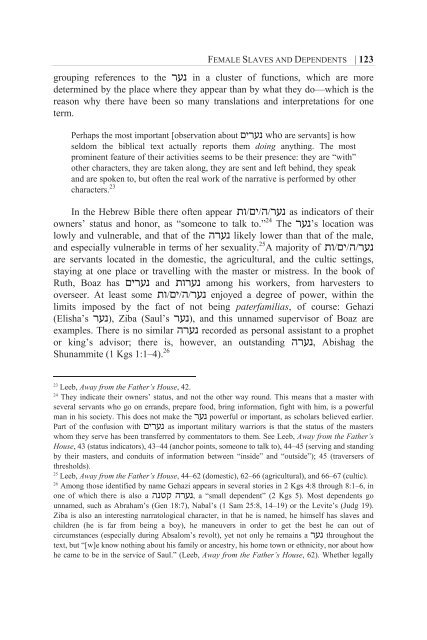Women at Work in the Deuteronomistic History - International Voices ...
Women at Work in the Deuteronomistic History - International Voices ...
Women at Work in the Deuteronomistic History - International Voices ...
Create successful ePaper yourself
Turn your PDF publications into a flip-book with our unique Google optimized e-Paper software.
FEMALE SLAVES AND DEPENDENTS | 123<br />
group<strong>in</strong>g references to <strong>the</strong> רענ <strong>in</strong> a cluster of functions, which are more<br />
determ<strong>in</strong>ed by <strong>the</strong> place where <strong>the</strong>y appear than by wh<strong>at</strong> <strong>the</strong>y do—which is <strong>the</strong><br />
reason why <strong>the</strong>re have been so many transl<strong>at</strong>ions and <strong>in</strong>terpret<strong>at</strong>ions for one<br />
term.<br />
Perhaps <strong>the</strong> most important [observ<strong>at</strong>ion about םירענ who are servants] is how<br />
seldom <strong>the</strong> biblical text actually reports <strong>the</strong>m do<strong>in</strong>g anyth<strong>in</strong>g. The most<br />
prom<strong>in</strong>ent fe<strong>at</strong>ure of <strong>the</strong>ir activities seems to be <strong>the</strong>ir presence: <strong>the</strong>y are “with”<br />
o<strong>the</strong>r characters, <strong>the</strong>y are taken along, <strong>the</strong>y are sent and left beh<strong>in</strong>d, <strong>the</strong>y speak<br />
and are spoken to, but often <strong>the</strong> real work of <strong>the</strong> narr<strong>at</strong>ive is performed by o<strong>the</strong>r<br />
characters. 23<br />
In <strong>the</strong> Hebrew Bible <strong>the</strong>re often appear תו/םי/ה/רענ<br />
as <strong>in</strong>dic<strong>at</strong>ors of <strong>the</strong>ir<br />
owners’ st<strong>at</strong>us and honor, as “someone to talk to.” 24 The רענ’s<br />
loc<strong>at</strong>ion was<br />
lowly and vulnerable, and th<strong>at</strong> of <strong>the</strong> הרענ likely lower than th<strong>at</strong> of <strong>the</strong> male,<br />
and especially vulnerable <strong>in</strong> terms of her sexuality. 25 A majority of תו/םי/ה/רענ<br />
are servants loc<strong>at</strong>ed <strong>in</strong> <strong>the</strong> domestic, <strong>the</strong> agricultural, and <strong>the</strong> cultic sett<strong>in</strong>gs,<br />
stay<strong>in</strong>g <strong>at</strong> one place or travell<strong>in</strong>g with <strong>the</strong> master or mistress. In <strong>the</strong> book of<br />
Ruth, Boaz has םירענ and תורענ among his workers, from harvesters to<br />
overseer. At least some תו/םי/ה/רענ enjoyed a degree of power, with<strong>in</strong> <strong>the</strong><br />
limits imposed by <strong>the</strong> fact of not be<strong>in</strong>g p<strong>at</strong>erfamilias, of course: Gehazi<br />
(Elisha’s רענ), Ziba (Saul’s רענ), and this unnamed supervisor of Boaz are<br />
examples. There is no similar הרענ recorded as personal assistant to a prophet<br />
or k<strong>in</strong>g’s advisor; <strong>the</strong>re is, however, an outstand<strong>in</strong>g הרענ, Abishag <strong>the</strong><br />
Shunammite (1 Kgs 1:1–4). 26<br />
23 Leeb, Away from <strong>the</strong> F<strong>at</strong>her’s House, 42.<br />
24 They <strong>in</strong>dic<strong>at</strong>e <strong>the</strong>ir owners’ st<strong>at</strong>us, and not <strong>the</strong> o<strong>the</strong>r way round. This means th<strong>at</strong> a master with<br />
several servants who go on errands, prepare food, br<strong>in</strong>g <strong>in</strong>form<strong>at</strong>ion, fight with him, is a powerful<br />
man <strong>in</strong> his society. This does not make <strong>the</strong> רענ powerful or important, as scholars believed earlier.<br />
Part of <strong>the</strong> confusion with םירענ as important military warriors is th<strong>at</strong> <strong>the</strong> st<strong>at</strong>us of <strong>the</strong> masters<br />
whom <strong>the</strong>y serve has been transferred by comment<strong>at</strong>ors to <strong>the</strong>m. See Leeb, Away from <strong>the</strong> F<strong>at</strong>her’s<br />
House, 43 (st<strong>at</strong>us <strong>in</strong>dic<strong>at</strong>ors), 43–44 (anchor po<strong>in</strong>ts, someone to talk to), 44–45 (serv<strong>in</strong>g and stand<strong>in</strong>g<br />
by <strong>the</strong>ir masters, and conduits of <strong>in</strong>form<strong>at</strong>ion between “<strong>in</strong>side” and “outside”); 45 (traversers of<br />
thresholds).<br />
25 Leeb, Away from <strong>the</strong> F<strong>at</strong>her’s House, 44–62 (domestic), 62–66 (agricultural), and 66–67 (cultic).<br />
26 Among those identified by name Gehazi appears <strong>in</strong> several stories <strong>in</strong> 2 Kgs 4:8 through 8:1–6, <strong>in</strong><br />
one of which <strong>the</strong>re is also a הנטק הרענ, a “small dependent” (2 Kgs 5). Most dependents go<br />
unnamed, such as Abraham’s (Gen 18:7), Nabal’s (1 Sam 25:8, 14–19) or <strong>the</strong> Levite’s (Judg 19).<br />
Ziba is also an <strong>in</strong>terest<strong>in</strong>g narr<strong>at</strong>ological character, <strong>in</strong> th<strong>at</strong> he is named, he himself has slaves and<br />
children (he is far from be<strong>in</strong>g a boy), he maneuvers <strong>in</strong> order to get <strong>the</strong> best he can out of<br />
circumstances (especially dur<strong>in</strong>g Absalom’s revolt), yet not only he rema<strong>in</strong>s a רענ throughout <strong>the</strong><br />
text, but “[w]e know noth<strong>in</strong>g about his family or ancestry, his home town or ethnicity, nor about how<br />
he came to be <strong>in</strong> <strong>the</strong> service of Saul.” (Leeb, Away from <strong>the</strong> F<strong>at</strong>her’s House, 62). Whe<strong>the</strong>r legally




